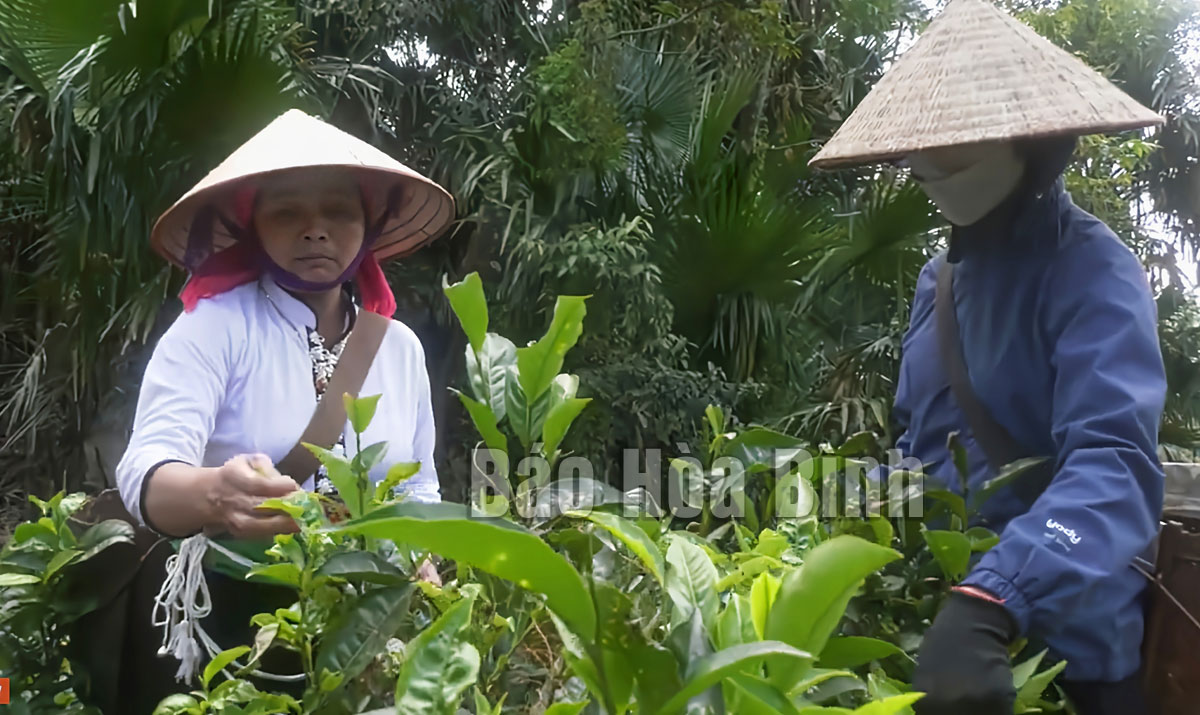
(HBO) - In the period of 2018 - 2022, Da Bac district has 7 products recognized as OCOP products with 3 stars or more by the Provincial People's Committee. However, in 2023, the district has 2 OCOP products that have stopped working. They are Trung Thanh Shan Tuyet tea because of the dissolution of the cooperative, and roasted Sachi seeds because the subject has stops producing the product. Thus, the district has 5 OCOP products, including Da Bia community tourism (Tien Phong commune); Cao Son corn wine, Cao Son vermicelli (Cao Son commune); Vinh Xuan rice wine (Toan Son commune); Tan Minh indigenous pork (Tan Minh commune).

Being recognized as a 3-star
OCOP product of the province and it has helped improve the economic value of
Shan Tuyet tea in Trung Thanh commune (Da Bac).
In the period of 2021 - 2025, Da Bac district aims to build and
develop on average 1 - 2 products that meet OCOP standards with 3 stars or
more. They are trying to have at least 8 products recognized as OCOP products
at the provincial level for the whole period. To accomplish the goal, the
district has been focusing on building the material areas in the direction of
linking production with the product consumption; the production scale is
gradually expanding, participating in the linkages along the value chains and
food safety chains. At the same time, they have clearly identified the
advantageous and competitive products to standardize and upgrade in the
direction of the potential products for export; encouraging the subjects to
continue registering to upgrade the star rating of products from 3 to 4 stars.
According to data from the Hoa Binh Provincial Party Committee, the industrial production index for the first six months of 2025 is estimated to have increased by 20% compared to the same period last year. This marks the highest year-on-year growth rate for this period since 2020.
In the first six months of 2025, Hoa Binh province’s export turnover was estimated at 1.145 billion USD, marking an 18.11% increase compared to the same period in 2024. Import turnover was estimated at $ 804 million, a 17.15% increase, which helped the province maintain a positive trade balance.
The lives of the ethnic minority farmers in Tan Lac district have gradually improved thanks to the new directions in agricultural production. This is a testament to the collective strength fostered through the professional associations and groups implemented by various levels of the district’s Farmers’ Union.
With the motto the "product quality comes first,” after nearly one year of establishment and operation, Muong village’s Clean Food Agricultural and Commercial Cooperative, located in Cau Hamlet, Hung Son Commune (Kim Boi district), has launched reputable, high-quality agricultural products to the market that are well-received by consumers. The products such as Muong village’s pork sausage, salt-cured chicken, and salt-cured pork hocks have gradually carved out a place in the market and they are on the path to obtaining the OCOP certification.
In the past, the phrase "bumper harvest, rock-bottom prices" was a familiar refrain for Vietnamese farmers engaged in fragmented, small-scale agriculture. But today, a new spirit is emerging across rural areas of Hoa Binh province - one of collaboration, organisation, and collective economic models that provide a stable foundation for production.
Maintaining growing area codes and packing facility codes in accordance with regulations is a mandatory requirement for agricultural products to be eligible for export. Recently, the Department of Agriculture and Environment of Hoa Binh province has intensified technical supervision of designated farming areas and packing facilities to safeguard the "green passport" that enables its products to access international markets.



